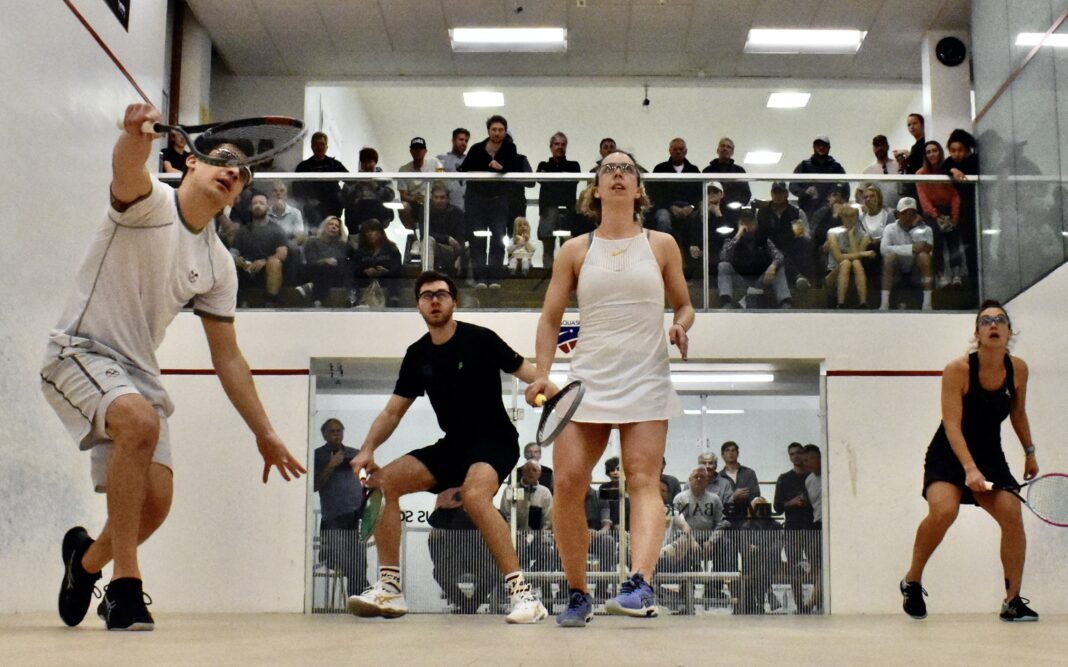By Rob Dinerman
Dateline May 10, 2023 — The 2022-23 Squash Doubles Association (SDA) season, the first in which the men’s and women’s tours both played under the SDA umbrella, was characterized by an ever-changing set of tournament winners on the 14-tournment men’s schedule, the clear-cut supremacy of one team in the six women’s events, the extremely significant in-season retirement of one of the best and most entertaining players in the history of professional doubles and a late-season experiment with the scoring system that may well define the future of doubles squash. Incredibly (and unprecedentedly) the first seven SDA ranking tournaments were won by seven different teams and the theoretical maximum of 14 different players, a spreading out of the wealth during that considerable five-month span that was at opposite ends of the spectrum from a season-ending stretch during the last few weeks of the immediately-prior 2021-22 season in which Manek Mathur and Chris Callis swept the last four tournaments they entered, those being Boston, Cleveland, the Kellner Cup in New York and the North American Open Doubles in Greenwich.
The season-opening SDA tour stops this past autumn in Louisville (Lockie Munro and Lyell Fuller), St. Louis (Osama Khalifa and Kyle Martino), the Big Apple Open in New York (Mathur and Callis), Sleepy Hollow (Zac Alexander and James Bamber), Wilmington (Clinton Leeuw and Jaymie Haycocks), the Briggs Cup in Rye (James Stout and Scott Arnold) and the early-January Ox Ridge event in Darien (Ryan Cuskelly and Cameron Pilley) were all won by different teams in a dizzying kaleidoscope of results before first-year partners Alexander and Bamber finally gave the tour its first repeat-winner when they captured the North American Open in late January, defeating Mathur and Callis — whom Alexander/Bamber had previously out-played two months earlier in the Sleepy Hollow final, ending a five-tournament, 19-match Mathur/Callis winning streak dating back to this past March — in the final.
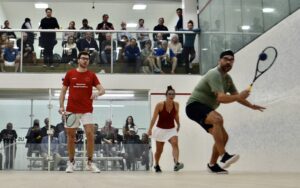 There were close calls along the way for a number of those eventual champions. Mathur and Callis rallied from a two games to one deficit in their Big Apple Open quarterfinal with Khalifa/Martino; Alexander and Bamber won two of their games in the four-game Sleepy Hollow final by a total of three points; Leeuw and Haycocks lost the first two games of their Wilmington semifinal against former Princeton teammates Dave Letourneau and Kelly Shannon and barely won the third 15-13 before handily winning the next two games and all three games of their final with Clive Leach (who had turned 50 a few weeks earlier!) and Ricardo Lopez; and in the North American Open, Alexander and Bamber were two games to one down in their semi with recently-crowned Briggs Cup champs Stout and Arnold.
There were close calls along the way for a number of those eventual champions. Mathur and Callis rallied from a two games to one deficit in their Big Apple Open quarterfinal with Khalifa/Martino; Alexander and Bamber won two of their games in the four-game Sleepy Hollow final by a total of three points; Leeuw and Haycocks lost the first two games of their Wilmington semifinal against former Princeton teammates Dave Letourneau and Kelly Shannon and barely won the third 15-13 before handily winning the next two games and all three games of their final with Clive Leach (who had turned 50 a few weeks earlier!) and Ricardo Lopez; and in the North American Open, Alexander and Bamber were two games to one down in their semi with recently-crowned Briggs Cup champs Stout and Arnold.
A DRAMATIC RETURN AND A SIGNIFICANT SWAN SONG
One week after that latter tournament, at a Challenger event at the Pittsburgh Golf Club on the final weekend in January, John Russell, a two-time (in 2015 and 2019) winner of the SDA Player of the Year Award, made a dramatic return to the tour — for the first time in the three years since he and Arnold had won the 2020 North American Open — and partnered Martino to the winner’s circle. When the tour resumed in late February, the David C. Johnson Memorial tournament in Brooklyn Heights was given a large dollop of existential spice by the fact that Mathur, the four-time and reigning SDA Player of the Year, and without question the tour’s most successful and dynamic player throughout the past half-decade, had announced beforehand that this tournament would constitute his career swan song. The Hollywood script would have had Mathur — whose 36 SDA titles ranks fifth all-time behind only Damien Mudge, Gary Waite, Ben Gould and Jamie Bentley, and whose mother, Arati, had flown over from India to witness her son’s final performance — partnering Callis to the Johnson championship and ending his career in a blaze of glory. But instead Stout and his first-time partner Bamber (the head pro at the host Heights Casino Club) won in four games. Stout has now won the Johnson the last three times it has been held, with three different partners (Badan in 2020 and Arnold in 2022 after Covid forced the cancellation of the entire 2020-21 season).
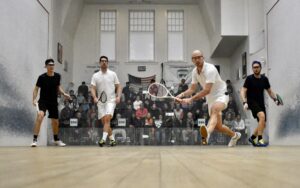 Callis resiliently teamed up with Alexander and Russell to win the next pair of tour stops at the University Club of Boston and the Tavern Club in Cleveland, defeating Stout/Arnold and Matt Henderson/Adam Bews in those respective finals. In both the latter tournament and the Racquet & Tennis Club Open in Manhattan, the SDA experimented with the scoring system by having all games go to 11 points (rather than 15), with a team having to win a game at 10-all by a clear margin of two until/unless it becomes 14-all, at which juncture whichever team scores the next point thereby wins the game. The changed format definitely had an impact on the way the games were played, imbuing even the early portion of games with a higher level of immediacy and urgency. Both finals were close, with Russell and Callis winning, 11-8 in the fifth, over Henderson and Bews in Ohio, and Stout and Arnold edging Callis (appearing in his tour-leading fourth consecutive final, with four different partners) and Michael Ferreira, 11-9 in the fourth, at Racquet & Tennis in a match that was keyed by mid-game rallies (a six-point run from 3-6 to 9-6 in the second and a 9-1 burst from 1-5 to 10-6 in the third) by the eventual champions during the middle two games.
Callis resiliently teamed up with Alexander and Russell to win the next pair of tour stops at the University Club of Boston and the Tavern Club in Cleveland, defeating Stout/Arnold and Matt Henderson/Adam Bews in those respective finals. In both the latter tournament and the Racquet & Tennis Club Open in Manhattan, the SDA experimented with the scoring system by having all games go to 11 points (rather than 15), with a team having to win a game at 10-all by a clear margin of two until/unless it becomes 14-all, at which juncture whichever team scores the next point thereby wins the game. The changed format definitely had an impact on the way the games were played, imbuing even the early portion of games with a higher level of immediacy and urgency. Both finals were close, with Russell and Callis winning, 11-8 in the fifth, over Henderson and Bews in Ohio, and Stout and Arnold edging Callis (appearing in his tour-leading fourth consecutive final, with four different partners) and Michael Ferreira, 11-9 in the fourth, at Racquet & Tennis in a match that was keyed by mid-game rallies (a six-point run from 3-6 to 9-6 in the second and a 9-1 burst from 1-5 to 10-6 in the third) by the eventual champions during the middle two games.
One of the most noteworthy aspects of the Racquet & Tennis tournament was the extraordinary main-draw performance of the three teams who survived the grueling qualifying rounds. Since 26 teams entered the tournament and only 10 teams were “straight in” to the 12-team main draw, there were 16 teams vying for the two remaining main-draw slots, which meant that each team in the qualifying had to win three matches to make it into the main draw. Remarkably, both teams that did so — Dave Letourneau/Jeff Osborne and Sanjay Jeeva/Lockie Munro — then proceeded to win their round-of-16 main-draw matches (over Chris Sachvie/Hameed Ahmed and Osama Khalifa/Greg McArthur respectively), as did David Yacobucci and Ashley Davies, who had lost a close (11-9 in the fourth) match to Letourneau and Osborne in the final round of qualifying but were subsequently lucky-losered into the main draw when the Alexander/Bamber team had to withdraw on the eve of the tournament. Reprieved by this turn of events, Yacobucci and Davies won their round of 16 match as well against Ricardo Lopez Valdivia and Thijs Van der Pluijm before losing to the eventual champs Stout and Arnold in the quarterfinals. For one team in the qualifying to then also win its first main-draw match, especially in such a tough draw as in this tournament featured, is somewhat unusual — but for all three qualifying-draw teams to win their first main-draw match (before in each case losing their fifth match in 48 hours, in each case to a top-four seeded team playing its first match of the tournament) is truly praiseworthy, and unique in the history of the SDA.
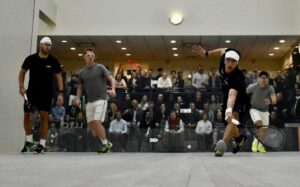 Martino and Henderson won the tour’s final event at the Buffalo Club, defeating top seeds (and winners in Buffalo in 2017 and 2019) Russell and Arnold in the semis and first-time partners Bamber and Davies in the final, in each case in five games. Martino’s advances to the winner’s circle with Khalifa in St. Louis, Russell in Pittsburgh and Henderson in Buffalo made him a three-time tournament winner this past season, as were Callis (with Mathur at the Big Apple Open, Alexander in Boston and Russell in Cleveland), Stout (with Arnold at the Briggs Cup and at Racquet & Tennis and with Bamber in Brooklyn), Bamber (with Alexander at Sleepy Hollow and in Greenwich and Stout in Brooklyn) and Alexander (with Bamber at Sleepy Hollow and in Greenwich and Callis in Boston). Martino also won the only Mixed Doubles tournament on the schedule when he and Gina Stoker defeated Celia Pashley and Lucas Rousselet in the finals at the Hashim Khan Open in Denver.
Martino and Henderson won the tour’s final event at the Buffalo Club, defeating top seeds (and winners in Buffalo in 2017 and 2019) Russell and Arnold in the semis and first-time partners Bamber and Davies in the final, in each case in five games. Martino’s advances to the winner’s circle with Khalifa in St. Louis, Russell in Pittsburgh and Henderson in Buffalo made him a three-time tournament winner this past season, as were Callis (with Mathur at the Big Apple Open, Alexander in Boston and Russell in Cleveland), Stout (with Arnold at the Briggs Cup and at Racquet & Tennis and with Bamber in Brooklyn), Bamber (with Alexander at Sleepy Hollow and in Greenwich and Stout in Brooklyn) and Alexander (with Bamber at Sleepy Hollow and in Greenwich and Callis in Boston). Martino also won the only Mixed Doubles tournament on the schedule when he and Gina Stoker defeated Celia Pashley and Lucas Rousselet in the finals at the Hashim Khan Open in Denver.
Interestingly, Martino had never teamed up with Russell, Henderson or Stoker prior to his tournament-winning forays with them in Pittsburgh, Buffalo and Denver respectively. Russell/Callis (Cleveland) and, as noted, Stout/Bamber (Brooklyn) were tournament-winning first-time partnerships this past season as well. At no time during the 2022-23 SDA schedule did the same team win two tournaments in a row, and the only pairings that won two tournaments at any stage of the season were Stout/Arnold and Alexander/Bamber. Thirteen of the 16 finals had at least one player who was playing in his first final of the season, with Callis’s seven final-round advances being tops on the tour. Sixteen different players won at least one SDA tournament and there were 27 different finalists, a number of them for the first time in their pro doubles careers.
MARKED CONTRAST
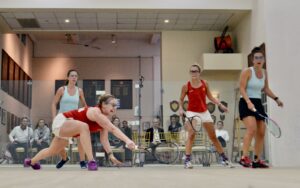 The season-long pattern of new faces getting into the late rounds seemingly every week on the men’s tour was in marked contrast to the inaugural SDA women’s circuit, in which Kayley Leonard and Maria Elena Ubina, teammates on two Greenwich Academy teams that won the U. S. High School Team Nationals a decade ago, reached the final round of all five tournaments that they entered, winning four of them, three times at the final-round expense of the Landman twins, Elani and Lume, who themselves were stopped short of the finals only once in their five forays, that coming in the semifinal round of the Briggs Cup at the hands of Stoker and Line Hansen, who then lost their ensuing final to Leonard and Ubina. The latter duo had won all three of their finals against the Landmans in 2021-22, and the same outcome occurred at the inaugural women’s Heights Casino Pro event in late October.
The season-long pattern of new faces getting into the late rounds seemingly every week on the men’s tour was in marked contrast to the inaugural SDA women’s circuit, in which Kayley Leonard and Maria Elena Ubina, teammates on two Greenwich Academy teams that won the U. S. High School Team Nationals a decade ago, reached the final round of all five tournaments that they entered, winning four of them, three times at the final-round expense of the Landman twins, Elani and Lume, who themselves were stopped short of the finals only once in their five forays, that coming in the semifinal round of the Briggs Cup at the hands of Stoker and Line Hansen, who then lost their ensuing final to Leonard and Ubina. The latter duo had won all three of their finals against the Landmans in 2021-22, and the same outcome occurred at the inaugural women’s Heights Casino Pro event in late October.
But when these two teams met again just two weeks later at the NYC Open, held at the University Club of New York, the Landmans were able to conjure up a breakthrough win, and in three games at that, in a match in which a number of factors, ranging from tactical to psychological to even topographical, played a role in their 15-10, 13 and 14 reversal. First and foremost, the Landman sisters, who had almost immediately fallen behind 11-4 in the opening game in Brooklyn, this time were able to seize the early initiative, giving them a level of purpose and confidence that was abetted by the patience they demonstrated in successfully applying their strategy of using the height of the court to lob their opponents to the back wall and then shoot when they had an opening. In Brooklyn, the points had been relatively short, with both Leonard and Ubina establishing front-court position and scoring early-point winners, whereas at the high-ceilinged University Club — representing a substantial difference from the environment at Heights Casino, whose lower ceiling and hanging beam make it much more difficult to effectively execute lobs and skid-boasts — the Landmans were able to lob more effectively and thereby prevent Leonard and Ubina from implementing the quick-strike capacity that had served them so well a fortnight earlier.
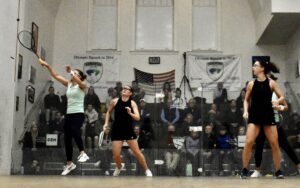 With all that, and even when trailing 13-8 in the third game after narrowly falling short in the 15-13 second, Leonard and Ubina drew to 12-13 and then (after Leonard tinned to drop shot) to 14-all on a pair of nervy Leonard winners, the second of which ended a point that Ubina had kept alive with a remarkable “emergency” retrieve near the back wall a few exchanges earlier. Losing that game after having such a seemingly safe lead against opponents whom they had never beaten in four attempts might have been a tough hurdle for the Landmans to overcome. But Elani Landman responded to the exigencies of the moment by burying a shallow backhand drive that stayed too low for Leonard to scoop up.
With all that, and even when trailing 13-8 in the third game after narrowly falling short in the 15-13 second, Leonard and Ubina drew to 12-13 and then (after Leonard tinned to drop shot) to 14-all on a pair of nervy Leonard winners, the second of which ended a point that Ubina had kept alive with a remarkable “emergency” retrieve near the back wall a few exchanges earlier. Losing that game after having such a seemingly safe lead against opponents whom they had never beaten in four attempts might have been a tough hurdle for the Landmans to overcome. But Elani Landman responded to the exigencies of the moment by burying a shallow backhand drive that stayed too low for Leonard to scoop up.
This pair of split results between the women’s tour’s two best teams provided an intriguing competitive backdrop to the biennial Briggs Cup at the Apawamis Club — where Lume Landman is currently the Head of Junior Development and where Leonard learned the game from the tournament honoree and the club’s long-time head pro Peter Briggs — in early December. But the Landman sisters sustained their only pre-finals loss in the past two years to Gina Stoker and Line Hansen in the semifinals. After losing the first two games of their ensuing final against Leonard/Ubina (semis winners over Pashley and Lauren West), Stoker and Hansen led 13-9 in the third, only to surrender the final six points, on the last of which Ubina executed a perfectly-angled forehand roll-corner winner with both her opponents deep in the court.
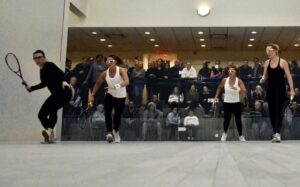 Back in the saddle after their Briggs Cup performance, Leonard and Ubina won the inaugural women’s North American Open in January and then successfully defended the University Club of Boston title which they had won the year before, in each case with decisive final-round wins over Elani and Lume Landman. Ubina and Leonard, both of whom spent their entire college careers during the twenty-teens in the Nos. 1 and 2 positions at Princeton and Harvard respectively, complement each other beautifully — Ubina has a formidable and imaginative front-court game and is always a threat to shoot, whereas Leonard is solid, error-free and achieves great depth on her lobs, drives and cross-courts. Both are excellent retrievers and they have played enough together to coordinate their court coverage better than any team on the women’s tour.
Back in the saddle after their Briggs Cup performance, Leonard and Ubina won the inaugural women’s North American Open in January and then successfully defended the University Club of Boston title which they had won the year before, in each case with decisive final-round wins over Elani and Lume Landman. Ubina and Leonard, both of whom spent their entire college careers during the twenty-teens in the Nos. 1 and 2 positions at Princeton and Harvard respectively, complement each other beautifully — Ubina has a formidable and imaginative front-court game and is always a threat to shoot, whereas Leonard is solid, error-free and achieves great depth on her lobs, drives and cross-courts. Both are excellent retrievers and they have played enough together to coordinate their court coverage better than any team on the women’s tour.
The 2022-23 SDA season was the first in the four years since 2018-19 to be completely free of any pandemic-caused disruptions, and it represented an encouraging step forward for professional doubles squash in North America. So does the appointment late this past season of Suzie Pierrepont as the manager and director of the SDA for the 2023-24 men’s and women’s tours. Her immediate priorities, as spelled out by SDA Board of Directors Chairman Kevin Luzak in a letter he wrote to the players in March, will include quality control with respect to event management and coordination with players; continued growth of the schedule and membership roster; and further integration of the men’s and women’s tours. She will also pursue new sponsorship opportunities for the SDA and further avenues of expansion. The stage appears to be set for a best-ever SDA Tour starting this coming autumn.
Rob Dinerman has covered the professional doubles tour extensively throughout the past 22 years. His most recent book, A History Of The Briggs Cup, was released this past December as part of the milestone 10th edition of that tournament. All of his books are arrayed on the home page of the robdinerman.com website and there are more than 500 of his articles on the Dinerman Archive of the squash website dailysquashreport.com

